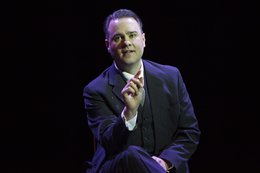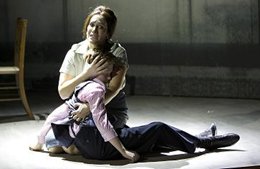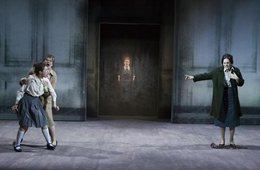There are, as historian R.F. Foster puts it (in another context), "strange nullities" at the heart of Benjamin Britten's The Turn of the Screw. Is it an opera about child abuse? Probably, but it's unclear what form the abuse takes. Is it a ghost story? Possibly, though the word is not used by the children's Governess, nor in Henry James' original story. Is Quint a predatory homosexual? Probably, but there's nothing in the libretto or stage directions to prove it.
The most striking feature of Oliver Mears' new staging of The Turn of the Screw is his refusal to populate those "nullities" - those spaces left eerily empty by Britten, with his own directorial theories, glosses and imaginings. Mears’ approach is altogether bolder, and subtler - to let mysteries remain mysterious, leave that which cannot easily be scrutinised inscrutable, and above all, when words fail, to let the music do the talking.
The music talks eloquently in this production, and from the outset, where Andrew Tortise delivers an engrossing account of the backstory in the "Prologue", scrupulously attentive to the precise inflections of Britten's writing, and acted with telling  economy of gesture on a chair stage-centre. Tortise sings mellifluously throughout the evening, with none of the hootiness or quivery vibrato which can afflict the Britten tenor. Quint's melismatic siren-calls to Miles are horribly insinuating, yet strangely alluring - exactly the ambivalent effect Britten intended, and Tortise catches it precisely.
economy of gesture on a chair stage-centre. Tortise sings mellifluously throughout the evening, with none of the hootiness or quivery vibrato which can afflict the Britten tenor. Quint's melismatic siren-calls to Miles are horribly insinuating, yet strangely alluring - exactly the ambivalent effect Britten intended, and Tortise catches it precisely.
Mears is careful to limit the physical contact between Quint and Miles to the merely elliptical - the boy's hair is stroked (gently, unintimidatingly), his shoulder touched (lightly). If Quint's strange hold over Miles is sexual (the music tells us only that it is darkly threatening and mysterious), then we're left to infer it. In Britten's world (and Mears'), as in Greek drama, acts of violence or violation are consigned to invisibility, and are all the more disturbingly suggestive for it.
Mears' direction of the two children in the cast is also tellingly nuanced. For all their helplessness, he never allows them to seem wholly innocent, whether in the unsettlingly internalised account he draws from Thomas Copeland of Miles' eerie 'Malo' song, or in the stylised, larger-than-life cod-ballet Lucia Vernon (as Flora) dances later. From an early stage both children seem infected by the influence of Quint and the former governess Miss Jessel, and beyond redeeming, although the new Governess is impelled to attempt redemption.
(as Flora) dances later. From an early stage both children seem infected by the influence of Quint and the former governess Miss Jessel, and beyond redeeming, although the new Governess is impelled to attempt redemption.
This level of subtlety and suggestiveness is possible only with gifted singing actors, and both Copeland and Vernon give remarkably resonant performances as the children. The scene where Miles plays in a flamboyantly ornate fashion on the piano, often dumb-vamped with keyboard concealed from the audience, is virtuosically mimicked in full view here by Copeland, who clearly knew virtually every note and nuance of Britten's swirlingly complex accompaniment. It made a difference seeing the maelstrom of emotions underlying Miles' playing so vividly depicted.
The women are strongly cast. Dublin soprano Fiona Murphy, singing her first Governess, catches the character's vulnerability and mounting anxieties very effectively. Her tone is fulsome, the voice strongly underpinned technically, and her conception of the part already impressively differentiated. Giselle Allen, an experienced Jessel (on this occasion sporting the operatic equivalent of a Jedward quiff), is a wounded, haunting presence, vituperative in her excoriation of Quint, her ripe soprano palpitating with emotion. Yvonne Howard, as housekeeper Mrs Grose, gives face and individuality to a character verging on the stereotypical.
 Designer Annemarie Woods' cleverly configured assortment of sliding flats and panels, arranged differently from scene to scene, recreates the country house interiors. In the pit Nicholas Chalmers confirms the positive impression he made in last year's NI Opera Tosca, conducting incisively but also lyrically when necessary. The fourteen players - some multi-tasking to cover the demands of Britten’s brilliantly imagined chamber orchestration - respond with clean, limpidly textured contributions: Robert Bottriell’s haunting interventions on celesta, and Dianne Marshall’s lingeringly fragile harp-strokes at the opera’s conclusion, were two moments particularly worth savouring.
Designer Annemarie Woods' cleverly configured assortment of sliding flats and panels, arranged differently from scene to scene, recreates the country house interiors. In the pit Nicholas Chalmers confirms the positive impression he made in last year's NI Opera Tosca, conducting incisively but also lyrically when necessary. The fourteen players - some multi-tasking to cover the demands of Britten’s brilliantly imagined chamber orchestration - respond with clean, limpidly textured contributions: Robert Bottriell’s haunting interventions on celesta, and Dianne Marshall’s lingeringly fragile harp-strokes at the opera’s conclusion, were two moments particularly worth savouring.
In the week when the site-specific staging of Tosca won this year's Irish Times award for Best Opera, this clear, untendentiously provocative and strongly sung production of Britten's chamber masterpiece shows NI Opera forging further forward. Plans for the company’s second full season will be announced shortly, and are awaited with sharp anticipation.
Terry Blain is an arts journalist and cultural commentator, contributing regularly to BBC Music Magazine, Opera Britannia, Culture Northern Ireland and other publications.